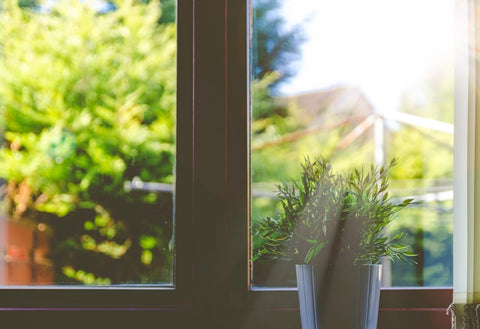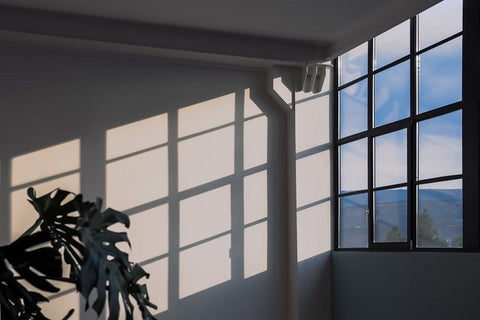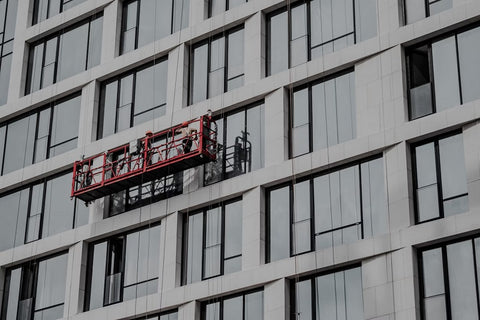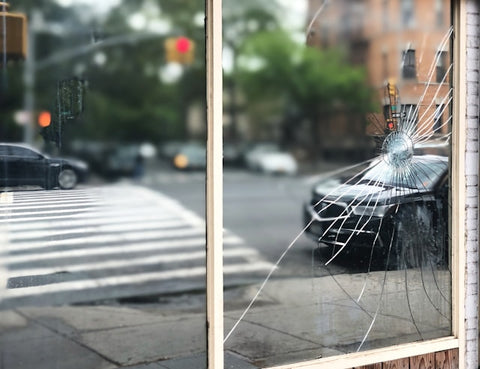We all want to feel secure in our own spaces. One way to enhance our safety at work, school, or home is using security film for windows. It's a simple yet helpful solution that many people overlook. This guide will explain why home security matters and how security film for windows can make a big difference.
Before we dive in, don't forget to get some security cameras for your home safety. OK, let's go.

What is a Security Window Film?
Window film isn't limited to decorative purposes. It also serves as a security measure in addition to a battery security camera. There are various types of window film, but not all offer security or protection.
Types of Security Films for Windows:
- Solar Control Films
Other than protection, these films also block UV rays and reduce glare. It keeps indoor temperatures comfortable. It keeps indoor temperatures comfortable.
- Safety Films
These films are meant to keep glass from shattering into pieces upon impact. Hence, they are useful in places prone to accidents or natural disasters.
- Security Films
Thicker and tougher, these films are designed to resist forced entry and vandalism. It provides a barrier against break-ins.
Technology Behind Security Window Films:
- Micro-Layering
This technology uses many layers of polyester to create a strong, tear-resistant barrier. These layers ensure the toughness of the window films.
- Adhesive Systems
Special adhesives are used to apply the films. Ensuring the films stick well to the glass even in extreme conditions. This adhesive is crucial for keeping windows intact during impacts.
- Impact Resistance
Security films are built to absorb and spread out impact energy. This will reduce the risk of glass breaking.

The Top Benefits of Installing Security Window Film
Security film for windows provides several benefits for your home or office. Let's take a look at some of the top benefits it brings:
- Protection Against Break-ins and Burglaries
Security window film acts as a strong barrier against intruders. It will make it harder for them to break through windows and enter your property.
- Increased Safety During Natural Disasters
Severe weather or natural disasters can cause regular glass windows to break. It poses a danger from flying glass shards. Security window film helps keep shattered glass together, reducing the risk of injuries.
- UV Protection and Energy Savings
Security window film blocks harmful UV rays, protecting your belongings from sun damage. Additionally, it helps to keep indoor temperatures more stable, potentially reducing energy costs.
- Privacy Benefits Without Sacrificing Natural Light
Privacy is important, but so is natural light. Security window film offers both by providing privacy without blocking out sunlight completely.
How to Choose the Right Security Window Film for Your Home
Selecting the right security film for windows is crucial for enhancing the safety and protection of your home. With many options available, it's important to consider several factors.
Factors to Consider
- Thickness
Opt for a security window film with adequate thickness because thicker films are generally more durable and offer better protection. These films usually range from 4 to 12 mil in thickness.
- Material
Look for high-quality materials such as polyester or PET. They are known for their durability and strength.
- UV Protection Level
Consider the level of UV protection offered by the film. Seek out security window films that not only reject solar heat and filter visible light but also effectively block up to 99% of harmful UV rays. This level of protection helps safeguard your furnishings and skin from potential harm.
- Transparency
Decide on the level of transparency you desire. Some security films are virtually invisible while others may have a tint or reflective coating.
Specifications and Ratings
It's essential to understand the specifications and ratings associated with security film for windows. Pay attention to factors such as impact resistance, tear strength, and adhesive strength. Additionally, look for certifications from reputable organizations. Those certifications will confirm the film's performance and quality.
Comparing Brands and Products
Take your time to research and compare brands or products in the market. Look for customer reviews, ratings, and testimonials. Do this to assess the performance and reliability of different security films. Consider factors such as cost, warranty, and extra features offered by each brand.

DIY vs. Professional Installation: What You Need to Know
Deciding whether to install a security window film yourself or hire a professional is an important choice. Let's break down what you need to know:
Step-by-Step Guide for DIY Installation
Step 1: Make sure your windows are clean before you start.
Step 2: Measure your windows accurately and cut the film to fit.
Step 3: Peel off the backing and carefully apply the film to the window. You can use a squeegee to smooth out any bubbles.
Step 4: Trim away any extra film from the edges using a sharp blade or knife.
Step 5: Go over the film again to make sure it's smooth and secure.
When to Call in a Professional and What to Expect
Doing the installation by yourself can be a cost-effective option. But sometimes, it's better to get help. Consider calling in a professional if your situation is:
- If your windows have tricky shapes or are in hard-to-reach places.
- If you're short on time or lack the right tools. A professional can save you the hassle and get the job done faster.
- Professionals have the experience to make sure the job is done right, which can give you peace of mind.
Cost Comparison and Long-Term Value Analysis
When comparing DIY vs. professional installation, consider the long-term value. Doing it yourself can be cheaper, but mistakes might cost you more in the long run. Professionals might charge more upfront, but it often includes guarantees or warranties.
The choice depends on your budget, skill, and project needs. By weighing the pros and cons of both options, you can make the best decision for your security film for windows installation.
Common Myths and Questions About Security Window Film
Security film for windows is a helpful tool for boosting safety in homes and offices. But, there are some misunderstandings about what it can and can't do.
Misconception about Security Window Films
- Myth: Security Window Film Are Costly
The average cost of installing security film on residential windows typically ranges from $7 to $8 per square foot. While this might seem like a lot at first, think about the potential damage from break-ins or severe weather. Investing in security film for windows now can save you money in the long run by preventing costly repairs or replacements.
- Myth: Security Window Film Stops All Break-Ins
In reality, security window film makes it difficult for intruders to enter, but they might still find a way. It's best to combine it with other security measures like a battery security camera.

Common Questions: What Can I Expect from Security Window Film?
Security film for windows is a useful tool, but it's important to understand its limits. With realistic expectations, it can be a valuable addition to your security setup. Here are some realistic things you can expect from security films for windows:
- Added Protection
Security window film helps hold broken glass together, making it safer during accidents or break-in attempts.
- UV Protection
Many types of security film offer UV protection to protect furniture and floors from sun damage.
- Privacy
Some security window films offer privacy by making it hard to see inside from outside while still letting light through.
- Energy Savings
Certain films can help regulate temperatures. It helps reduce heat in the summer and retain warmth in the winter. Therefore, it leads to saving energy.
Maintenance and Care for Your Security Window Film
Tips for cleaning and maintaining the film
Here are some simple tips for cleaning and maintaining your security film for windows:
- Gentle Cleaning
Use a soft cloth or sponge with a mild, non-ammonia cleaner to clean the film. Avoid harsh chemicals or abrasive materials that could damage it.
- Regular Cleaning
Establish a routine for cleaning your window to keep it free from dirt and fingerprints. Regular cleaning helps maintain its clarity.
- Be Careful
When cleaning, avoid applying too much pressure or using sharp objects near the edges. Use gentle strokes to prevent damage.
- Thorough Drying
After cleaning, use a dry cloth to dry the film, ensuring no moisture or streaks are left behind.
How to inspect for wear and tear films
- Regular Checkups
Periodically inspect your security film for windows for any signs of wear or damage. Pay more attention to the edges and corners.
- Look for Damage
Check for peeling, bubbling, or lifting of the film. If you notice any significant damage, consider consulting a professional for repairs or replacement.
- Assessing Condition
If the film is no longer providing adequate protection, it may be time to replace it with a new film.
Case Studies: Real-life Success Stories of Security Window Film in Action
Security film for windows has proven to be a powerful defense against break-ins and vandalism in real-life scenarios. In January 2025, Aurora's business district faced rampant theft, prompting the City to invest in local business security. This funding facilitated the installation of security measures, such as bullet-resistant window film.
Evidence of the efficacy of these city-funded safety enhancements is seen in Scott Davenport's experience with his store, Heirloom Antique Mall. Having endured multiple break-ins in the past, Davenport now attests to a noticeable decrease in criminal incidents targeting his business.
"It was really bad for a while, but it's gotten better," said Davenport. "It's frustrating. The damage and cost to fix it is sometimes worth more than the things they take."
Choosing the Best Security Window Film: Top Picks for 2025
Choosing the perfect security film for windows is crucial for enhancing the protection of your home. Let's check out some top picks for 2025, along with their strengths, weaknesses, and best uses:
|
Brands |
Pros |
Cons |
Best Uses |
|
3M Safety and Security Window Film Ultra S800 |
● Strong protection against break-ins ● UV rays reduce glare |
● Can be pricey ● May need professional help for installation due to its thickness. |
Great for high-security spots like offices or government buildings. |
|
LLumar Magnum Security Film |
● Excellent tear resistance and impact strength ● UV protection |
● Thick and may need professional installation ● It might darken windows. |
Works well for both homes and businesses looking for security without compromising on looks. |
|
SunTek Security Window Film |
● Offers various options for protection and transparency to fit different needs. |
● Some versions may not be as tear-resistant ● Professional help is recommended when installation |
Versatile choice suitable for homes, stores, or offices. |
|
Armorcoat Safety and Security Window Film |
● Known for its strong adhesive and tear-resistant properties, offering reliable protection. |
● Limited options for transparency ● May need professional help for installation. |
Perfect for busy places, public spots, and areas prone to extreme weather. |
Conclusion
Safeguard your home using security film for windows and combine them with battery-powered cameras. Security window film offers protection against break-ins, UV rays, and enhances privacy. While battery-powered cameras provide flexibility, convenience, and reliable surveillance. By integrating these technologies, homeowners can strengthen their homes against potential threats. Thus, providing peace of mind and ensuring a safer living environment.
FAQs
What is the ideal thickness for security window film?
Typically, security film for windows ranging from 8 mil to 14 mil thickness is widely recommended for various security needs.
How durable is window film?
Professional installation of window film ensures longevity. The film lasted up to 20 years when properly maintained.